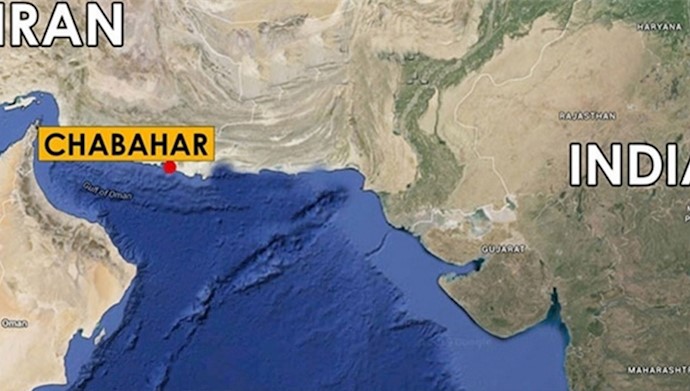Analysis by PMOI/MEK
Iran, November 15, 2018 – On November 6, the U.S. government excluded Iranian Chabahar port from the latest round of sanctions. The Iranian regime called that a retreat on the part of the U.S. and its propaganda machine highlighted it as a victory.
Iranian state-run Channel One television broadcasted on November 7: “After [other] countries didn’t follow to implement the sanctions, the American government was forced to exempt Chabahar port from the sanctions too. According to the U.S. state department announcement, following the waivers for eight countries that import oil from Iran out of fear that they won’t follow [the sanctions], Washington is now saying that putting a sanction waiver on the development project of Chabahar port is helping the economy of Afghanistan.”
Now, why did the U.S. really exempt Chabahar from sanctions and how much a role does the Iranian regime play in this?
Chabahar is a port city on the south-east end of Iran and has a strategic viewpoint on the Oman sea. This port connects India to Afghanistan and other Central Asian countries. Considering that for India, Chabahar port has the potential of enabling it to remove Pakistan, India’s archrival, from the transport equation of Indian goods to Afghanistan and other Central Asian countries, this port takes an important role for India. Now, creating a modern railway system that connects Chabahar to say Afghanistan and the rest of Central Asia takes the whole idea to the next level. This is something that is planned and under way too.
That’s why India has negotiated and successfully received the rights to develop Chabahar port. Reports suggest that India has already invested around 500 million USD in Chabahar and has planned a $1.5-billion investment to build a series of roads and railways that connect the port to Central Asia. It’s worth noting that Chabahar port will reduce India’s costs and require time for transporting goods to Central Asia to a third of its current amount.
A spokesperson for the current U.S. administration recently said that its strategy towards Southern Asia builds around to pillars: Supporting the economic development of Afghanistan and creating a climate for a growing and close relationship with India.
On November 10, Entekhab website quoted an Indian newspaper and wrote: “The exemption of Chabahar port from the U.S. sanctions list against Iran is the product of massive efforts and pressure by New Delhi and Kabul on Washington, because [this port] has a strategic importance to the Indian and Afghan economy.”
According to Entekhab, these meetings have taken place in the most senior levels between Afghanistan and the U.S. and Ajit Doval, India’s national security advisor, has also raised the issue of Chabahar with his U.S. counterpart, John Bolton, and Mike Pompeo, U.S. secretary of state.
Jahan Sanat newspaper, which focuses on economic issues, also wrote: “Since India considers China its competitor in its trading relationships with the U.S., the U.S. does not want China to weaken India in its own waters. Truth is that the exemption of Chabahar port from the sanctions regime is a response to this very Indian need so that it helps them to move beyond China…”
“It should be noted that this strategic joint venture—although it may bear fruit in the long term due to a cooperative trading approach by Kabul, Tehran and New Delhi—is a hopeless cause in short term because the U.S. with its investigations in Iran’s approach in operating Chabahar will create a situation where Iran can’t use this waiver for circumventing the sanctions regime,” Jahan Sanat adds.
IRNA news agency also writes:
“The Chabahar issue has been raised in a number of meetings between Indian and American officials including in the recent two trips of Brian Hook, a senior U.S. official, to India.”
As you can see, even Iranian state-run media acknowledge that the exemption of Chabahar from the sanctions regime is in no way connected to the Iranian regime and is not a sign of U.S. weakness or retreat. It is rather a pragmatic approach in a complicated and broad regime of intelligent sanctions where the U.S. is protecting its own interests in the region while ensuring that the Iranian regime does not receive the economic benefits which it would had used for malevolent purposes anyways.
In order to avoid a positive feedback loop where the Iranian people and the international community are encouraged to keep the current course—one by increasing the sanction regime and the other by popular protests manifested in different ways—the Iranian regime has launched a propaganda campaign claiming that the sanctions have no real impact and will create no political change, it’s the poor and ill that are the primary targets of the sanctions—ignoring completely that there has never been an embargo on humanitarian goods like food, medicaments, etc.—and that the U.S. is isolated and has no help in its current policy. Scoring the Chabahar waiver as a point for the mullahs’ team is clearly a desperate and pathetic move to cover the real perils the Iranian regime faces.
It’s also interesting how the Iranian regime’s lobbies in the West have taken up this same narrative and effectively legitimize and support a murderous regime that doesn’t shrink back from plotting terrorist attacks in Europe and the U.S.





